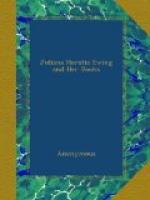Julie did absolutely remain “the same” during the three months of heavy suffering which, in GOD’S mysterious love, preceded her death. Perhaps it is well for us all to know that she found, as others do, the intervals of exhausted relief granted between attacks of pain were not times in which (had it been needed) she could have changed her whole character, and, what is called, “prepare to die.” Our days of health and strength are the ones in which this preparation must be made, but for those who live, as she did, with their whole talents dedicated to GOD’S service, death is only the gate of life—the path from joyful work in this world to greater capacities and opportunities for it in the other.
I trust that what I have said about Julie’s religious life will not lead children to imagine that she was gloomy, and unable to enjoy her existence on earth, for this was not the case. No one appreciated and rejoiced in the pleasures and beauties of the world more thoroughly than she did: no one could be a wittier and brighter companion than she always was.
Early in February 1885, she was found to be suffering from a species of blood-poisoning, and as no cause for this could then be discovered, it was thought that change of air might do her good, and she was taken from her home at Taunton, to lodgings at Bath. She had been three weeks in bed before she started, and was obliged to return to it two days after she arrived, and there to remain on her back; but this uncomfortable position did not alter her love for flowers and animals.
The first of these tastes was abundantly gratified, as I mentioned before, by the quantities of blossoms which were sent her from friends; as well as by the weekly nosegay which came from her own Little Garden, and made her realize that the year was advancing from winter to spring, when crocuses and daffodils were succeeded by primroses and anemones.
Of living creatures she saw fewer. The only object she could see through her window was a high wall covered with ivy, in which a lot of sparrows and starlings were building their nests. As the sunlight fell on the leaves, and the little birds popped in and out, Julie enjoyed watching them at work, and declared the wall looked like a fine Japanese picture. She made us keep bread-crumbs on the window-sill, together with bits of cotton wool and hair, so that the birds might come and fetch supplies of food, and materials for their nests.
Her appreciation of fun, too, remained keen as ever, and, strange as it may seem, one of the very few books which she liked to have read aloud was Mark Twain’s “Adventures of Huckleberry Finn”; the dry humour of it—the natural way in which everything is told from a boy’s point of view—and the vivid and beautiful descriptions of river scenery—all charmed her. One of Twain’s shorter tales, “Aurelia’s unfortunate Young Man,” was also read to her, and made her laugh so much, when she was nearly as helpless as the “young man” himself, that we had to desist for fear of doing her harm. Most truly may it be said that between each paroxysm of pain “her little white face and undaunted spirit bobbed up ... as ready and hopeful as ever.” She was seldom able, however, to concentrate her attention on solid works, and for her religious exercises chiefly relied on what was stored in her memory.




